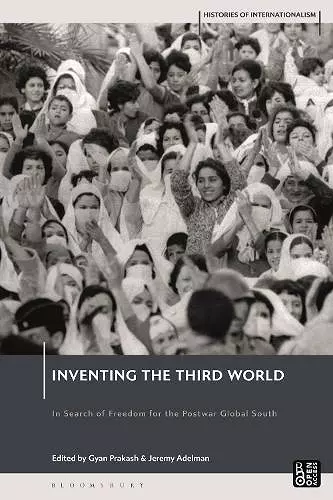Inventing the Third World
In Search of Freedom for the Postwar Global South
Professor Gyan Prakash editor Jeremy Adelman editor
Format:Hardback
Publisher:Bloomsbury Publishing PLC
Published:1st Dec '22
Currently unavailable, and unfortunately no date known when it will be back

An edited collection that explores the ways in which the global south reimagined the future world order at the end of the Second World War, and the cultural and intellectual breakthroughs that these new narratives created.
This open access book explores the ways in which the global south reimagined the future world order at the end of the Second World War, and the cultural and intellectual breakthroughs that these new narratives created. The end of the Second World War and the eclipse of empires brought a wave of efforts to reimagine the future world order. When nation states emerging from colonial rule met at Bandung to chart alternative destinies and challenge global inequalities, they hoped to create a less hierarchical, more pluralistic and more distributive world. This volume considers the alternative visions put forth by the third world at the close of WWII to recover their world-changing aspirations as well as its cultural and intellectual breakthroughs.
Demonstrating how the invention of the third world sought to create new institutions of solidarity, new expressions and alternative narratives to the imperial ones that they had inherited, this book reveals how writers, artists, musicians and photographers created networks to circulate and exchange these ideas. Exploring these ideas put forth from various regions of the global south, the chapters trace their search for new meanings of freedom, self-determination and the promise of development. Out of this moment came efforts in the south to create new histories of global relations, icons and genres, and placed the promises of decolonization and struggles for social and racial justice at the centre of global history.
Showing how efforts to remake the world intersected with and altered the trajectories of the global Cold War, Inventing the Third World discusses how this conflict existed outside of the traditional east-west framework and offers an insight into a radically different ‘global cultural cold war’. It shows that the Cold War era was marked by attempts to bring about a different world order that would achieve global racial, social justice and a different kind of peace.
The ebook editions of this book are available open access under a CC BY-NC-ND 4.0 licence on bloomsburycollections.com. Open Access was funded by Princeton University, USA.
"In 2007, Vijay Prashad proposed the notion that the Third World was not a place but rather a project. Inventing the Third World is an important new book that demonstrates how this project, pursued on many fronts as a work in progress, not only was relevant during the turbulent years of the Cold War but, with its notions of development, peace, and social justice, might still be relevant for the world of today. * Hispanic American Historical Review *
This splendid volume does an excellent job of extending the history of the Bandung moment in both directions to frame it in the long twentieth century, and revises its spatial framework to show how Latin America is a crucial part of a picture too often confined to Eurasia, Africa and the Arab world. * Arjun Appadurai, Professor of Media, Culture, and Communication, New York University, USA *
The concept of the “Third World,” a term frequently used pejoratively in Euro-America, comes to live here in its full potential and promise. This is a story of transnational networks and nodal points, and of the quest to create an alternative, more equitable global order beyond empire. An important intervention and fascinating reading! * Sebastian Conrad, Professor of Global History, Free University of Berlin, Germany *
Bringing together leadings scholars of decolonization and global history, this volume embodies the political and geographic scale of the Third World. Mapping the cross-cutting itineraries of third worldism and traversing its lesser-known tributaries, these essays highlights the Third World’s emancipatory possibilities as well as the geopolitical and ideological differences that fractured solidarities. * Adom Getachew author of Worldmaking after Empire: The Rise and Fall of Self-Determination *
Inventing the Third World recovers the inspiring aspirations, neglected actors, and persistent tensions of anticolonial internationalism in its struggle to create liberatory futures. This collection is a magnificent contribution to the global history of our present and a precious resource for imagining how the world could be otherwise. * Ayça Çubukçu, Associate Professor in Human Rights and Co-Director of LSE Human Rights, London School of Economics and Political Science, UK. *
Inventing The Third World could not be a more timely or trenchant intervention into the engorged ambitions of the accumulative, all embracing, globalization that dominates our current predicament. To portray the “third world” as an alternative or antidote to the bipolar condition of a world divided by the Cold War is to shrink its ambition and downscale its significance. The Third World --- as idea, ideology, aspiration --- was an experiment in transformational living and thinking on a world scale. The very concept itself was a call to create a cosmopolitical political culture of hospitality and equality, that embraced the diversity of the arts, and the regional autonomy of custom and culture. To read Prakash and Edelman’s volume is to encounter an optimism about what might once have been, and what may be yet to come. * Homi K. Bhabha, Anne F. Rothenberg Professor of the Humanities at Harvard University and author of The Location of Culture *
ISBN: 9781350268159
Dimensions: unknown
Weight: unknown
296 pages